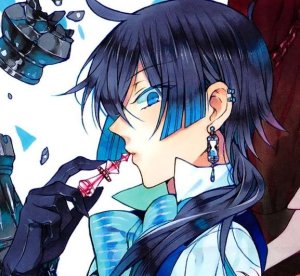
I'm gonna start by praising Naomi Watanabe and I may be biased because I admire her a lot, but she did an amazing job in this (even while wearing an obvious wig, which I suppose was for character reasons, since her fashionable hair right now wouldn't have worked for the character). I entered this drama expecting Naomi to be a strong lead and to provide a view of a plus size woman, because between her clothing brand and her work in La Farfa, she's becoming an international beacon of diversity in media. And even though there are fatphobic remarks throughout the series and she is upset about them, she still breaks stereotypes that dramas tend to put upon plus size female characters. Kyoka is a smart, determined and resourceful woman who is finding the passion for her job after having lost it for some time and who proves once and again that, no matter where she's working or how people view her, she's the best in what she does; not for wanting to be so, but because she respects her clients and wants to make people happy. You go, girl.
The drama focuses on tours, but the key to each episode is a puzzle, a mystery that has to do with the personal reasons a client has for taking the trip and how the guides can help them achieve those goals and find what they're looking for (while also changing their lives for the better, no pressure). Hence, some detective drama goodness ensues.
The rest of the cast is great as well, Yusuke Yamamoto never disappoints and you know he's gonna give a 100% performance every time. Sara Takatsuki was amazing as well and her character is really interesting and fun to watch.
All in all, this drama has a lot of the things I love: good plot, mysteries, funny scenes, good performances and well developed female characters with a great female lead. I highly recommend it if you're into those things and even more if you'd like to see some amazing shots of Kyoto.
Cet avis était-il utile?

Hope - Kitai Zero no Shinnyu Shain
3 personnes ont trouvé cette critique utile
On the other hand, the plot drags a bit too much, there's way too much exposition, there isn't much of a focus at times and, worst of all, I have the sense that the message of it is for the young generation to just shut up and take it. An "it will happen to you too, you'll see" perspective. Some things get fixed, some things change, but you end up with the feeling that, in the grand scale of things, they really don't. While dramas like Underwear showcase how young people with drive, who reject or disagree with the status quo, can actually both learn from their seniors AND innovate and create something different that adapts with the current times, here I feel the point was for young people to learn to do things the same way and repeat the same mistakes. With very few exceptions.
The plot is basically salarymen, the trade business in Japan and everything that comes with it. We see the introduction to this world through a former shogi player turned into reluctant salaryman, Ichinose Ayumu (very well portrayed by Nakajima Yuto, and honestly I was surprised, he did very well here, he won an award for this). Alongside him, we meet other young interns trying to survive this world: the son of a leader of another company who wants to work his way up rather than use his dad's power to climb (very well performed by Seto Koji), a girl running from sexism in another company and encountering sexism again here because the world sucks (Yamamoto Mizuki) and a cheerful comic-relief-y guy who wants to be respected for his work (Kiriyama Akito).
Taking into account that there's a lot of male idols in this (I counted at least 5, between DBOYS, Johnny's and Amuse) and they did a pretty good job here in general (this was a really good one for Nakajima Yuto to settle the transition from school roles to older roles), I'm even more surprised that the category for idol actor in the 2016 poll was won by a non idol with a terrible role.
I wasn't very fond of Yamamoto Mizuki's performance specifically, but I was very interested in her arc and how it connected to Nakamura Yuri's arc, they really made a point about sexism in the workplace and how hard it is for women to work their way up the corporate ladder while appeasing Japanese social standards, I was indeed very interested in that aspect of the drama, I'm just sad it wasn't more prominent.
I don't even have to say Endo Kenichi carries this drama, I think that's self-explanatory by the fact that he's in it. Yamauchi Takaya does very well alongside him and the chemistry between them and Yuto is very good.
So, overall, it's fine. It could have been better, but it's good.
Cet avis était-il utile?

I was worried initially because finding actual LGBT+ representation in Asian media is difficult, especially when the drama is centered on gay men, most often it turns out that it's just BL fanservice meant for heterosexual women, or campy humor meant to stereotype for laughs. This drama was walking on thin ice for a good while but it redeemed itself in moments of introspection and had a very satisfying emotional ending, so I'd say it's worth enduring the rest.
There's a lot of harassment disguised as humor in this drama, though. Hayashi Kento's character initially is a bit inappropriate but redeems himself soon after and continues developing steadily, so don't lose your hope after episode one if it made you uncomfortable. It could be argued that he is a bit stereotypical in the domestic dynamic, but it pays off narratively for me, so he was a delight.
Yoshida Kotaro's character made me extremely uncomfortable throughout, as did Mashima Hidekazu's. I understand that the tone was meant as comedic at times, but since there were so many emotional moments and deep sincere things, the power dynamics of the situations and the level of pushing and forcing they inflicted made me feel off, to be honest.
I did like Uchida Rio's character, how they used her as a good female support character whose feelings are explored and she isn't a mere "obstacle" of a male narrative, or someone for female fans to hate, she was very dimensional and I appreciated that.
There were other characters and narratives I wasn't too interested in but, for the most part, this was a good drama and it was worth whatever I didn't agree with. I think the entire narrative was well focused, it had some cliches and simplifications, but it wasn't devoid of development, and it's a rom com where I had reasons to root for a couple because I could see them go through different stages of a relationship, rather than just longing looks and misunderstandings.
I'd recommend this to those who like rom coms with a bit of an extra spice, and as an LGBT+ drama, it isn't perfect but it's a good step forward. And, after all, I have to admit, the ending got me smiling for a while.
Cet avis était-il utile?

Ossan's Love Returns Spin-off Drama: Haruta to Maki no Shinkon Shoya
1 personnes ont trouvé cette critique utile
There are two side stories/special shorts (labeled here as “spin offs”) of Returns. One of them (Forbidden Gout Temps Nouveau) consists of two episodes and can be found in some places labeled as 9.1 and 9.2. This one (Haruta to Maki no Shinkon Shoya) is only one episode and can be sometimes found as a “special clip”.
This episode is approximately 10 minutes long and it’s a segment on Maki and Haruta reuniting and Maki coming to their new home for the first time. It can be watched after the series (that’s what I did) but, differently from the other spin off, I think it would have been ideal to watch it after episode 1 of the Returns season. It takes place after Maki returns and before they decide to call for a housekeeper (like, 9 minutes into episode 1?).
Some of the things that show up and are discussed in this special are mentioned or show up during the main season (the chores distribution, Maki not wanting to have home parties, Haruta wanting to have more dates, etc.). They also provide some small but actually interesting context of timeline regarding the previous installments, on how long it’s been since they’ve seen each other and why, having a long distance relationship, how Haruta got the house and why he got a house instead of an apartment…Honestly, there was more information than I expected for a short domestic 10 minute fluff, information I kind of wish I had while watching the season.
It’s not going to make or break the season experience not to watch it, but who would have thought so much interesting context could be packed in a 10 minute short of these two being flirty with each other. I hope this helps clarify the situation for those who might have been as lost as I was. I'm leaving the description of the other spin off in its own review.
Cet avis était-il utile?
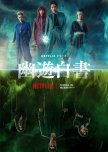
Here's the thing about this one: it's way too good for them to have adapted just this small portion of it and, with the script adaptation they had, they wrote themselves into a corner if they were interested to continue it.
The cast is sublime. I was expecting stellar work from Shison Jun (who you may recognize from other manga adaptations like Tricornered Window and that one shojo about a toxic monk) and Hongo Kanata (who you may recognize from other manga adaptations like The Prince of Tennis and GOTH) but Kitamura Takumi as Yusuke, Uesugi Shusei as Kuwabara, Furukawa Kotone as Botan and Shiraishi Sei as Keiko were all *chef's kiss*.
I don't think I can totally convey how very "Yusuke" Kitamura Takumi was. The facial expressions, the body language, the tone of voice. This guy got the assignment 100%. They all did.
The fight choreography was amazing, they all look so grounded and real, which is key for a shonen like Yu Yu Hakusho, in which battles are more rooted in the street fight and less on the grand effects (which we also get here, don't get me wrong).
They also did a great job with costume and make up, with added details in the classic outfits of characters like Kurama, Hiei and Yukina (the embroidery???).
The problem is that, with all the amazing ingredients they had, they still didn't have the confidence to pull a script that would allow them to continue this organically if they wanted.
Yu Yu Hakusho has four main arcs, the first one being the introduction to the world and Yusuke's detective work, the second one being the best arc in the manga/anime (and one of the best in manga/anime history maybe? am I exaggerating?): The Dark Tournament. For the Tournament to have the gravitas that it did, it required a lot of world and character building, introducing the human world and the demon world to then combine them together in this epic scenario.
This adaption merged the first and second arcs, getting rid of the Tournament setting and introducing The Big Bads of that arc in this one. They used pristine ingredients to cook only a snack.
This is not the first time (and probably won't be the last) in which an anime/manga adaptation blows the storyline in a first part, having to attempt to mend the pieces as best as possible in later adaptations, once they figure out it was a good idea to make more. Fullmetal Alchemist is a great example of that, with a first movie that changed a lot of the plot and having to fix it in the next two films, which thankfully were much better.
With this, though, it's very difficult to know how they could save it if they wanted. In order to do the Dark Tournament they'd have to change the characters they're going against or pull some writing gymnastics to justify it. And making another season with the third arc, Sensui's arc, wouldn't be at all impossible but it'd feel like we're missing the best part of Yu Yu.
I'm also not sure if there was enough room for this introduction to convey all that it had the potential to show to an audience that's unfamiliar with the source material. I think it will be entertaining and engaging to newcomers, it will most definitely interest them to know what happens to these characters next, but it would have probably been a lot more certain had they had the time to develop it more, like the anime/manga did.
All in all, it's a great adaptation, but it's disappointing that they squandered it in such few episodes, attempting to cram so much of the plot in them. If these 5 episodes would have been just the introduction of the world and characters, before the Tournament, it would have left the door clearly open for more, and I think audiences, fans and newcomers alike, would have wanted to see it. I hope they do make more, because this cast and director deserve it, but it's going to be a challenge to see how.
If I had any decision making power, though, I would also humbly request them to record the character songs because I feel they'd slay. Just saying.
Cet avis était-il utile?

When I heard that Erika Yoshida, who had written one of my favorite aroace characters of all time (Nozomi Fujisaki in Cherry Magic) was writing a whole drama with two aroace leads, I was looking forward to it immensely. After actually watching it, this drama did not disappoint in the least.
It's difficult to find aromantic, asexual or aroace representation in media. It's even more difficult to find good representation. Furthermore, fanon never helps with it, given that it's more often to see characters that could be interpreted as aroace in canon shipped in fanon, as if it was always, unequivocally, a "problem to fix".
This drama doesn't give you one, it gives you two aroace characters who, upon talking about their experiences, decide to live together and figure out if a family born from a love that isn't romantic can withstand just as strongly, whether society around them likes it or not, understands it or not, sees it for what it is or not.
Having two characters that are so diametrically opposed in personality (Sakuko is easygoing, charismatic, doubtful and insecure; Satoru is introverted, quiet, confident and passionate about what he loves to do) and who experience their aroace-ness in different ways, coming from different histories with relationships, makes it incredibly rewarding and allows to portray their identities not as a set, unmovable label, but as complex experiences on a spectrum.
A very pleasant surprise for me was Kazu, a character I thought was going to become too pushy with his amatonormativity, but he became a great asset to not only showcase how people can adapt to understanding others but also, probably, allow those who don't know about the aroace experience to have someone to learn with.
The story isn't a thrilling, action-packed one. This is one of the domestic, day-to-day, cozy ones. Both Satoru and Sakuko deal with work, their life aspirations, societal expectations, family and friends; but the seriousness with which the drama takes the subject and the way in which it centers itself in the portrayal of aroace experiences, makes it more emotionally vulnerable than other domestic dramas, especially if you identify. Honestly, I wish this drama was more easily available with different language subtitles so I could watch it with people who may not understand. I think it'd be a fantastic way to help those around learn about things that I wish they understood.
If you're anywhere in the asexual, aromantic or aroace spectrum, do yourself a favor and look for this drama. There is little else out there that does such a good job and has such respect towards the subject. I can only hope Erika Yoshida continues to give us this rep, because she is great at it.
Cet avis était-il utile?

The Prince of Tennis
1 personnes ont trouvé cette critique utile
The best live action Tenipuri I've seen to date
I'm sure this review is unnecessary, considering this title came out a minute ago and my opinion isn't worth much but I'd be dishonoring my younger self if I didn't give credit where credit is due where a Prince of Tennis product is concerned.Like the title says, this might be my favorite live action adaptation of Prince of Tennis (without counting tenimyu, because that's another beast entirely). Hands down.
Even though the characters and teams were re-named (due to the switch of country), their personalities were fleshed out really well and the characterization was delivered with a lot more nuance than I had anticipated. The relationships between the characters was explored more than in other live action versions and they chose their focus well.
The age of the characters was increased, going from the original middle school age (which is whacky bananas at this point, Konomi, that 40-year-old-looking-man is not 14) to a more believable high school age, with actors over the age of 20. That worked, not only because it fits the target audience better, but also because they were able to go in depth with added conversations I was super impressed with.
My favorite, for example, was that they gave Oishi/DaYong a struggle with anxiety that made his fight with Eiji/Jiale a lot more intense when it happened and the match against this version's Hyotei a lot more meaningful. It works really well narratively-wise to deepen his journey as a vice captain, considering his abilities and the situation regarding Tezuka/SiYang's health, with something like that, and they handled it really well.
They also gave Sakuno/Qi Ying more room, as well as her relationship with Ryoma/Lu Xia, which gives the show a bit more of a romantic flare than the original, not enough to interrupt the tennis, but enough to sustain the show in a market of cdramas by its own.
The references to the original were everywhere (cakes with chibi versions of the characters included) and, despite the insatiable censorship, the tension between the characters that the anime loves to play with was there 100%, for whoever wants to know.
All in all, I hope with all my heart this gets another season and we can see them at Nationals because it's been a blast and there's still more Prince of Tennis to adapt with a cast as great as this one.
Cet avis était-il utile?
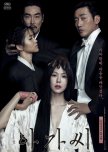
Watching this now, four years after it came out, I realize how many movies might have been inspired by this one, but none of them did this story as well. This movie is a masterclass of film making.
The script is exceptionally written, with twists, turns and moments of intrigue that fit together like a well-crafted puzzle. It's hard to describe the story without spoiling anything important, I suggest going in with as little information as possible and letting yourself be guided by the storytelling. Jung Seo Kyung did the best job in the entire movie with that script, but everyone played a part in making it shine.
The acting is mostly good, especially Kim Min Hee in a sublime performance. Her role is probably the most difficult to pull off efficiently, to tie in the suspense and the narrative of the story as it is, and she did an amazing job at it. My only problem, which is why this is not entirely a 10, is that some of the actors didn't fully convince me when it came to portraying the Japanese characters, but it didn't ruin the experience.
The movie is explicit, in different ways. There's a contrast between two different kinds of scenes that involve explicit content, and the way in which they are shot and performed, as well as written, weaves in a message that is super intense, in many ways.
It's absolutely, in my opinion, one of the best lgbtq+ films of the 2010s, I have no doubt about that. I had heard a lot about it and I had expectations, especially after having seen other films compared to it, but the expectations were met and surpassed. There is a love story between two women in the heart of this film that upholds and maintains the plot at all times, and everything is built upon showcasing that story, not only of love but also of redemption and empowerment.
All in all, great movie. Wow.
Cet avis était-il utile?
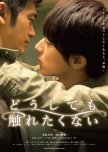
Doushitemo Furetakunai
1 personnes ont trouvé cette critique utile
I knew where I was getting into in terms of production value, considering it's a 2014 jmovie with a mlm subject matter based on a manga with actors that I knew from indie dramas or tokusatsus. When you've been around jdramas for a while, you kind of know what you can expect when you line all those things up. And yes, production value isn't the greatest and the direction had some very strange choices in terms of focus, zooms, framing and other things like that.
But the story and the performances are pretty good. I mean, it can get cheesy here and there, but it's actually pretty heartfelt and honest, and also focused on an adult relationship, with all that implies. It doesn't get unnecessary interruptions for shock value or easy dramatic flare, it deals with the two characters, their relationship, fears and worries and develops that throughout the movie. Maybe in a drama's length, they could have had more room to fit other nuances, but I thought it was pretty well balanced and overall well organized.
I'm really surprised that for a 2014 movie, they deal with the subject matter more openly, albeit being a bl adaptation with what that implies. They do talk about aspects of bullying, societal expectations, family and children, even if sometimes in a way that isn't as deep as other dramas that were to come years after, it's still done in a pretty interesting way for something of this kind, especially considering the climax of the storyline has to do with these things and with personal fears and values rather than external complications, as most romantic dramas (of any type of relationship) do.
After watching the movie, I read the manga, and I think that, surprisingly, the movie handled some things in a better way. The manga has a side relationship, which is very interesting in its own right but there wasn't room for it here, but when it comes to how subjects are portrayed, I think the movie did a good job of updating the narrative to a more inclusive lgbtq+ mindset instead of keeping some of the "bl" tropes that could make it problematic.
All in all, it was a pretty interesting and heartwarming movie, which focuses on an adult relationship, and the story for me was interesting enough to overlook all the things that may have distracted in terms of low budget or director choices.
Cet avis était-il utile?

The Confidence Man JP
1 personnes ont trouvé cette critique utile
What you need to know right away is that this is one of those dramas which, for the most part, consists of episodes which tell a "case" from start to finish, sort of one-shots, if you will. Each one is centered around one "catch", a character these three swindlers (Dako, played by Nagasawa Masami, Boku, played by Higashide Masahiro and Richard, played by Kohinata Fumiyo) are going to trick for their money. All of those catches are primarily set as "bad" people, but their nature sort of develops as the case grows, which leads to some very interesting character development and some insightful reflections that you don't normally get from this kind of drama in which comedy is very present.
The only episode which has a connection to what we could call an underlying plot, of sorts, is the last one, which is by far the best episode of the bunch and which made me up my rating from 7 to 7.5 because a) the writing is very good and b) Sato Ryuta is a delight.
My problem with the drama is that the dynamic between the characters gets a bit too repetitive for a story that stands so much on the unpredictable. Considering that the twists and turns have to do with how these people do their tricks, it would be better if their characters weren't so recurrent in the way they are with each other. They aren't one-dimensional but the repetition becomes both a bit exhausting and a bit predictable. You know who's the one that always has the upper hand, which one is the sentimental, which one is always lying and that can lead you to predict some twists and turns.
I wasn't a fan of Dako's character, which sucks because I like female leads out-witting people. But I was bothered about her attitude and the way the character lacked depth in comparison to others. The entirety of episode 8 I also disliked, I don't think the themes in it were handled well at all, but I can't expect much from male writers and directors handling the subject of the female beauty industry and representation of plus size characters correctly in jdramas, I've seen worse at least.
I'd recommend this drama to people who're looking for something fun, which can tend to the dramatic at times, shows some heart and those who don't want something too plot heavy to watch at a slower pace. If you like swindler-themed dramas, this one is a recommendable one of those.
Cet avis était-il utile?
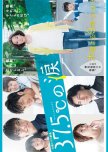
The story is about an introverted and hardworking girl, Sugisaki Momoko (played by Renbutsu Misako) who is a new asset of the agency Little Snow, which employs what we can call"nanny-nurses", people who take care of kids when they're sick enough they have to leave school yet not enough to be in a hospital. When parents can't take care of them because of work or other issues, these people are called in to help.
As in many medical dramas, the plot relates cases of the families Momoko works in with her own life in an abusive and neglecting household (content warning there), and we unravel Momoko's past and reasons for being the way she is step by step. Connecting with families with different realities and learning from parent-child relationships in very different environments, Momoko will discover more about her true calling in life.
The plot deals with very heavy subjects such as parental abuse, child neglect, toxic living environments and violence, but it does so in a way in which it isn't for shock value, it's narrated and explained and every perspective is depicted. It's not merely about parents or kids, it's about relationships, and I found its narrative very well handled. I'm not one to feel comfortable with these kinds of narratives and I was scared I wasn't going to be able to watch it all through, but the story is so well told and it gives you enough moments of peace to catch your breath and to keep wanting to watch. Instead of using the subject like a device to put people in a "good vs bad" situation, like other more popular jdramas which came last year did, this one shows it in grayscale and attaches it to the amazing performance of Misako as the lead character.
There's a bit of romance and a love triangle of sorts, but it's not really the center of the story (to the point in which a character actually states Momoko "doesn't have time for that right now"). There's fluffy and nice situations involving very adorable kids and their relationships with their parents, but I was also moved to tears for many different reasons more then once. Contrary to some, I don't feel the ending was rushed, I feel there's a very consistent narrative pace throughout the drama, and I'm very pleased with every aspect of it, especially the acting.
Cet avis était-il utile?

The plot probably isn't something you haven't seen before: indie band trying to break through and find their place in a very strict and unfair industry while facing personal strife and group struggle. Still, the story advances in a well-paced speed that doesn't leave you bored or unwilling to continue. At least, for me, that wasn't at all the case.
The characters are all pretty interesting in their own way, given that there's always characters who aren't as developed as others in this kind of format, and the acting is, in general, ok. It's not great, it suffers from some inexperience here and there, but the heartfelt moments are well done and the soul of the story is portrayed well enough. I really liked Hirano Sho in the lead and I think most people do. He has a character that could easily be the most annoying lead ever yet he makes it very convincing and belieaveable and achieves some great dramatic moments.
The music was definitely my favorite part of the drama. It's really REALLY good and I never got tired of it.
I felt the ending was a bit too open but I'm giving it a pass for the time being, considering there's a 2nd season I haven't yet gone through (although I'm aware it doesn't feature the same band and that already makes me a bit uneasy because these guys were pretty interesting).
All in all, a good musical drama with good music but where acting and plot aren't out of this world. Still, I really liked it and, if I was being more subjective, I'd give it a higher score because this is my kind of drama, but I'm trying to be completely fair. Those who like j-pop alone and are here for the cast should know this is definitely a j-rock based drama and those who came for the j-rock and are surprised about the cast should know the music is good and the genre is, all in all, well represented. It's a strange combination but I think it works out for the most part. I'd recommend it.
Cet avis était-il utile?

When it comes to acting, this drama has a great cast overall. Oguri Shun does a great job but I particularly enjoyed Shibasaki Kou a lot in this one, and Mizuhara Kiko is always a pleasure to watch. I also loved the production design, costume design and photography; it seems like an amazing production for a drama, I have high hopes for the movie on that regard. Whoever was in charge of the costume design has my utmost respect, honestly.
The pace, for me, was a bit slow at times, which is why I'm giving it an 8. I feel like the first episode put me in a mood that was slowed down a bit when the drama was half way through, to pick up again in the last 2.
And, as a last comment, I'll say that people who are very much into Japanese history and want something 100% accurate, almost biopic like, you should watch this drama with a different perspective. It does respect history but, being the plot as it is, takes diversions and freestyles some facts and characters.
That being said, it's a very recommendable drama and definitely a high point for last year's releases.
Cet avis était-il utile?

Cet avis était-il utile?
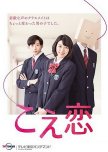
The plot of this drama is centered on a girl, Yoshioka Yuiko (very well portrayed by Nagano Mei) who falls for a classmate, Matsubara, after hearing his voice (to be fair, they chose Sakurai Takahiro to voice him, which is pretty brilliant, if you ask me, and seiyuus are really taking over idols lately in the j-music world, so this could be the beginning of something here, but I digress). When she meets him, we find out Matsubara hides his face behind a paper bag, something rooting in reasons we'll find out as the drama goes on. Yuiko accepts Matsubara since the very beginning and doesn't ask questions, focusing on who he is as a person and that relationship will help him open up about his past and his feelings.
There are, of course, love triangles galore. There's a couple girls who like Matsubara at different points of the drama, but I found them rather bland, especially in comparison to another character who is in love with Yuiko: Hyodo Makoto (brilliantly played by Ryusei Ryo). There are other smaller stories involving Yuiko's and Matsubara's best friends, as well as Makoto's friends (including a really good performance by Sakurada Dori).
This drama surprised me, in a good way. I was expecting that, for the whole cutesy aesthetic and the school romance, it was going to be just that, but it's so much more. There's social anxiety, growing issues, self-doubt, strong friendships and, since the whole harmless vibe it has leaves out any possibility of mindless bullying (everyone just accepts Matsubara without really asking much), it's allowed to focus on their inner troubles rather than cliche problems. Matsubara's biggest obstacle is always himself, as is Yuiko's, and that's very refreshing in this kind of story. Maybe a bit naive, but it's a different take on something we may have seen before, albeit in a different form.
I wouldn't go as far as to call it the Nobuta Wo Produce of its time, but it's definitely a breath of fresh air of actually meaningful relationships and healthy roads towards self-improvement in a year marked with toxic love triangles.
Cet avis était-il utile?

